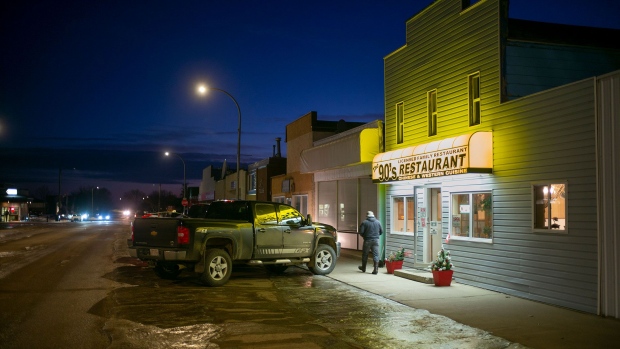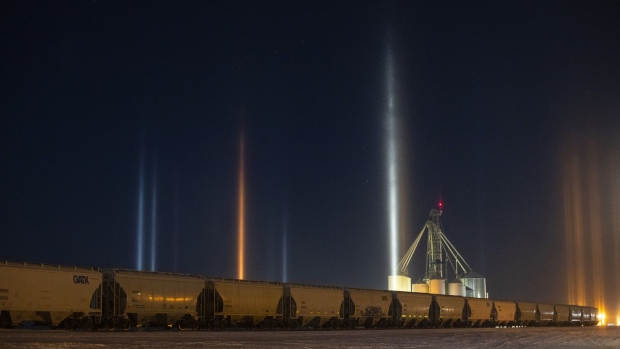Feb 5, 2021
Keystone XL cutoff shocks Alberta town where population doubled
, Bloomberg News
On the snowy prairies of Western Canada, a tiny town is grappling with the fallout from the 12-year saga of the world’s most controversial oil pipeline.
On his first day as U.S. president, Joe Biden signed an executive order rescinding TC Energy Corp.’s permission to build the US$8 billion Keystone XL. The 1,210-mile pipeline was designed to carry more than 800,000 barrels a day of Canadian oil sands crude to refineries in the U.S. when it entered service in 2023. It was also supposed to create some 13,000 union jobs. Biden’s decision may have fallen hardest on the eastern Alberta farming town of Oyen, where work on the project was already under way and local businesses were reaping the rewards.
Even though Biden, during his campaign, had pledged to cancel Keystone XL, the news still came as a shock to the town’s mayor, Doug Jones. “I did not expect to see that in the first hundred days,” he says. In recent months, Oyen had been buzzing with activity. Its population of 922 more than doubled with the arrival of about 1,000 workers. Some rented rooms in local homes, others bunked at so-called man camps. All together, they injected as much as $4 million (US$3.1 million) of extra spending into the local economy every month, Jones figures, helping counteract the drag from the pandemic.
- Keystone XL has 'no economic purpose': Former Husky CEO
- Alberta mulls U.S. compensation for scrapping Keystone XL
- Canada's pipeline future disappointing under Biden, if unsurprising
PIPELINE POLITICS
Debmart Cafe & Convenience on Main Street, a popular spot for sandwiches and eggs Benedict, was reeling from COVID-19 restrictions last March, before the pipeline crews arrived. “We had to lay everyone off when it first came into effect that they shut everything down,” says owner Deb Schiebelbein, adding that business had “at least doubled” after the workers came.

The staff at Debmart would prepare dinners for workers that they would pick up after their shifts. The cafe also changed its schedule to take advantage of the increased demand. “We opened Sundays to accommodate the pipeliners and they supported us really well,” Schiebelbein says. Biden’s decision to kill Keystone XL “wasn’t pleasant, but there really isn’t too much a person can say.”
The president’s move could bring down the curtain on a long-running drama that’s come to symbolize the clash between environmentalists and the oil industry. Green groups and celebrities including Mark Ruffalo and Daryl Hannah campaigned against the pipeline, arguing it would sully rivers and indigenous lands and worsen climate change by spurring further development of Canada’s high-carbon-emitting oil sands.
The Canadian oil industry, which for years has had to contend with a pipeline shortage that’s depressed local oil prices, countered that Keystone XL was the safest and cleanest way to deliver oil to the Gulf Coast refineries that are equipped to handle heavy crude. If the oil isn’t shipped by pipeline, much of it would be transported on rail cars, which can explode into massive fireballs in an accident.
TC Energy tried to tamp down opposition to the project by signing labor agreements with unions in the U.S., pledging to power the pipeline with 100 per cent renewable energy and offering to sell a $1 billion stake in the line to a coalition of Canadian indigenous communities. But those measures weren’t enough. “It’s devastating,” says Travis Meguinis, chief executive officer of Natural Law Energy Inc., an indigenous-owned company that sought to invest in the pipeline. “The communities were looking for hundreds of millions of dollars coming in.”
Within a day of Biden’s decision, TC Energy announced that work on the project had been suspended and that 1,000 people would be let go on both sides of the border. But in Oyen, hope remains that the project can be revived. Workers staying in a local camp next to the town were boarding buses in the morning of Jan. 23 to head to a work site. Site Resource Group, a subcontractor that employs as many as 60 people to perform COVID disinfection and other site management work for the Keystone XL project, is conducting “business as usual,” says Senior Vice President Roger Didychuck. The company hasn’t reduced its workforce as it waits for instructions, he says. “We are just working as normal.” Biden’s announcement was a “shock,” he says. “We thought there would be some negotiation, and maybe there still is.”

Keystone XL has died before only to be revived. President Obama rejected a permit application in 2015 before signing the Paris climate agreement. That decision was reversed more than a year later when the more fossil-fuel-friendly Trump assumed the presidency. Construction work began in Canada last spring, spurred by $1.5 million in investment from Alberta’s government.
Alberta Premier Jason Kenney called Biden’s decision an “insult” and demanded that Canadian Prime Minister Justin Trudeau retaliate with trade sanctions if the U.S. doesn’t negotiate. Trudeau, eager to reset relations with the U.S. after a strained relationship with Trump, expressed “disappointment” but said little more. The province is contemplating legal action and may have to sell unused pipe to recoup losses, said Kenney at a press conference.
This time, the cancellation could be the final blow. Oil pipelines face increased opposition from environmentalists and the communities they pass through. Energy Transfer LP’s infamous Dakota Access pipeline, which became operational in 2017 following a months-long standoff with indigenous groups, is at risk of getting shutdown as a result of a recent U.S. court decision. Michigan is trying to shut Enbridge Inc.’s Line 5, claiming its passage under the Straits of Mackinac threatens the Great Lakes.
Investors are also shunning the oil sands as they reduce support for the dirtiest forms of fossil fuel. In the latest such move, the New York State Common Retirement Fund put eight Canadian oil sands companies, including Suncor Energy Inc. and Imperial Oil Ltd., on notice to either transition away from hydrocarbons or face investment restrictions.
Still, Canada’s oil producers have reason for optimism. Construction on two other pipelines is under way, and they’re scheduled to enter service in the next two years. Combined, they’d provide more than enough export capacity for oil sands producers, with some room to accommodate increased production volumes over the coming decade.
Pipeline projects have come to Oyen before, including the first Keystone pipeline, which was put into service in 2010. Based on that experience, some townspeople had already expected the economic stimulus to be fleeting. “It’s not going to add long-term jobs, just a little bump,” says Richard Woods, the owner of the local Ace Hardware store. He says he was getting as many as 120 customers a day coming in to buy everything from tools to phone chargers last year, compared with about 100 during normal times. “I don’t think the town has changed.”
— With Kevin Orland





